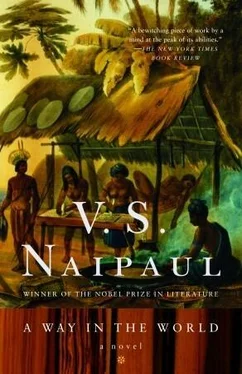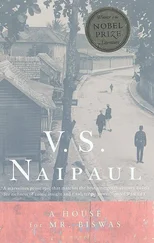RICHARD HAD appeared to say that he was going to ask me to a dinner he was arranging for Blair. No invitation came, and it was through Moses Lubero, the compound fixer, and my own servant Andrew that I learned about Blair’s arrival. The houseboy whom Lubero assigned to Blair came from Andrew’s tribe and was possibly a close kinsman of Andrew’s. He hadn’t worked in the compound before, and Lubero had to get a permit for him to leave his village and come to work in the town. The place was full of regulations like this, which meant that at every stage there were people who had to get a little money.
The new houseboy looked like Andrew, I thought, but was younger and smaller. He didn’t wear houseboy whites, like Lubero; he followed Andrew and wore flared blue jeans. The jeans he wore were a little too big for him (they might have been Andrew’s) and he had to have big turn-ups. For a week or so he spent much time with Andrew in the small bungalow kitchen (getting crowded, with the driver there as well) and I believe Andrew was teaching him how to cook and generally do things. One morning I saw the new man go to a hibiscus shrub outside the bungalow and very carefully cut and strip a little twig. Andrew would have sent him out to do that and was no doubt keeping an eye on him at that moment: at lunchtime I saw two sections of the very twig sharpened to a point and stuck on either side of a piece of boiled corn. So I knew that one day soon Blair would come back to his bungalow or apartment from his discussions in the Ministry of Finance or wherever and start his lunch with boiled corn with hibiscus handles.
At the end of the first month Andrew sold his bicycle to the new man, and Andrew (through Lubero, of course) bought another, better bicycle, which would have made him borrow a little more. So now the new man would come cycling up to my bungalow to be with Andrew. Sometimes he did so in the middle of the morning, and sometimes then Andrew would cycle away with him, no doubt to straighten out some disaster in Blair’s kitchen.
Houseboys were free in the afternoon, and for two or three weeks Andrew and his kinsman spent some of this free time cycling about together in the compound. It was a form of celebration. They were showing off their new bicycles and happiness and style. The new man began to wear Andrew’s white-rimmed plastic shades. They were small for him, too, and the arms sloped high above his ears. Andrew two or three days later began to wear new wrap-round shades; and then, stealing a further march on the new man (who could do nothing to catch up until pay-day), he took to wearing a tie on these afternoon rides.
They were doing it to be noticed, but when one afternoon I saw them cycling past, Andrew gave a smile, almost a laugh, which was at once an expression of pleasure and a way of saying that he knew the whole thing was quite ridiculous. Then immediately, for the benefit of his kinsman now, he tightened his mouth, looked ahead, and went serious again, and the two of them, very like one another, moved steadily away on the neat black-asphalted road with its whitewashed kerb, below the brilliant orange-and-yellow flowers of the tulip trees planted in colonial days, both of them pumping on the pedals in measured revolutions, the new man sitting on a saddle a little too high and straining to keep his feet on his pedals all the way down: celebrating their happiness and security and luck, Blair’s houseboy and mine, in the landscaped grounds of the compound which was like an echo of the oilfield compounds in Trinidad which both Blair and I had known only from the other side of the fence in 1949, when we were both at hopeful moments of our life, and when we felt that the world was beginning to change, though we could never then have seen the changes that were going to bring us here, to an African country that to us at the time was only a name.
IT WAS at De Groot’s bungalow that I at last met Blair. De Groot was a lecturer in African history at the university. He was about my own age. He had done a certain amount of original work on the Swahili culture of the coast, and his position at the university was far too modest. He had been moved aside once or twice for Africans, but he thought that in an African country this was as it should be, and he didn’t really mind. He had been born in East Africa and wanted to live nowhere else. That, in fact, was his principal ambition: to be always in Africa, to migrate nowhere else.
His father was a New Zealander who had gone to East Africa before the Great War. He was an engineer and builder and in East Africa he did small-scale construction work for the railways. His business failed during the Depression, and he lost the remainder of his money in his old age, when he quarrelled with his settler neighbours and started lawsuits against them. He had never been “a ‘settler’ settler,” to use his son’s words.
The same was true of the son (though he could mimic the settler voices); and he wasn’t much of anything else either. De Groot, the son, understood all attitudes in this part of Africa, and was detached from them all. He divided the expatriate lovers of Africa on the compound into “cob-cullers,” deer-hunters, people on an extended safari, and “ matoke- eaters,” plantain-eaters, people who wanted to pretend for a while that they were Africans. He saw himself as belonging to neither group (though he knew that to some people he looked like a matoke -eater). He never defined himself, but I think his attitude was that he was simply a man in his own setting, and fascinated by everything in that setting. In Africa he had no special cause; people looking for a man with a cause found him incomplete.
He was a bachelor. He liked friends, conversation, stories, jokes. His bungalow was the standard compound bungalow and absolutely the same as mine, in dimensions and plan and fittings, but it seemed much nicer. It was at the edge of the compound, on slightly sloping ground, with a view at the back, beyond a dip, of unregulated bush outside the compound stretching away to the next slope. Most people in the compound decorated their rooms with standard African artifacts — drums, spears, shields, zebra-skin pouffes, carved figures. (The vendors came around constantly; I bought some rubbish myself in the early days.) De Groot had an African eye, and apparently simple objects in his sitting room — like a wooden comb from a particular tribe, with variegated light-catching patterns carved with a relish that made you feel you would like to do some wood-carving yourself — were things you could give attention to and constantly see afresh. But the main reason why De Groot’s bungalow was so attractive was because of the man himself. He was intelligent and quick, and without malice. He was completely open. You felt when you were with him that he took a delight in your character, your oddities, your presence.
(He was one of the people I thought I should go and see again before beginning this book. He had long ago left the university; he never said, but I believe life there had finally been made too hard even for him. Later he had done some semi-academic half-jobs; notes on Christmas cards had given me the vaguest ideas of those jobs. He had published a few things, but then he seemed to have drifted away from academic life altogether. I had no idea what he was doing when I wrote to him.
He misunderstood my letter: he thought I was going to be with him in a few days. He couldn’t come to meet me, he said; he was going to send his driver; he described the driver. He said he had run out of Earl Grey tea; he wanted me to bring him some. He had a little farm now. Things were still chaotic, but there were a lot of books and he thought I would be comfortable. I knew the area where the farm was. It was scrubland, dusty, not welcoming. I felt that “farm”—with its suggestions of fields and fruitfulness — might have been too big a word for what he had. I imagined his house as a rougher version, but in wilderness, of his compound bungalow.
Читать дальше












